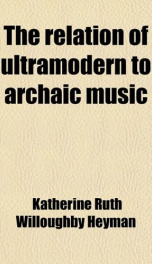the relation of ultramodern to archaic music

Purchase of this book includes free trial access to www.million-books.com where you can read more than a million books for free. This is an OCR edition with typos. Excerpt from book: RHYTHM RIYTHM is in the year and its seasons recurrently flowing. Time is their marking off into days and hours. Calendars change, but the silent procession of the seasons goes on, regardless of man's reckoning. Was ever the Equinox changed by Gregory or Julian ? Does Spring hop into Summer on a given day with an "accent"? Let flow our music as the seasons flow. You feel that you want an " accent" on the first beat? Very well, what kind? What is the "first beat"? Perhaps one might call it an appearance. Let us say the dancer leaps from off-stage and lands on the scene upon that first beat. Does he stand there, or land there with a bang? He appears in an unbroken flight from non-appearance there could not be a cut in the rhythm or the time before his landing. And the end of that leap is a beginning. This involves elasticity, a rebound to the next thing and the next and the next. That continuous motion is a manifestation of Rhythm. It is not monotonous or fatiguing to muscle or to sense, because it is resilient: alternate expansion and contraction, alternate action and passivity. Yet it is not fifty per cent action and fifty per cent passivity; rather would I say it is ninety-nine per cent the passive alertness of the wild animal, and one per cent lithe spring. The spring must be to passive alertness again. Then, suppose you are a dancer already on the scene, a musician in the midst of the composition. Your accent on the first beat may not be the end of a leap, in that case. Try an agogic accent a pathetic accent a quantitative accent, at the top or the bottom or the middle of things. 'You have run up wait a bit; you have gone down stop to turn round; you have come to a middle give us an instant's time to realize it is the middle. The Russian opera accents its s...
Info about the book
Author:
Series:
Unknown
ISBN:
0226012670
Rating:
3/5 (1)Your rating:
0/5
Languge:
English
Users who have this book
Users who want this book
What readers are saying
What do you think? Write your own comment on this book!
write a commentGenre
if you like the relation of ultramodern to archaic music try:
Other books by this author
Do you want to exchange books? It’s EASY!
Get registered and find other users who want to give their favourite books to good hands!

